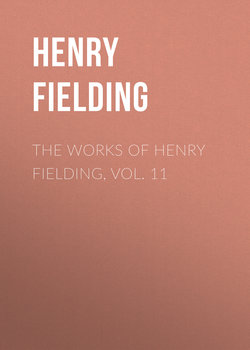Читать книгу The Works of Henry Fielding, vol. 11 - Генри Филдинг, Henry Fielding - Страница 16
BOOK I
Chapter xiv
ОглавлениеAdventures in the person of a monk
“FORTUNE now placed me in the character of a younger brother of a good house, and I was in my youth sent to school; but learning was now at so low an ebb, that my master himself could hardly construe a sentence of Latin; and as for Greek, he could not read it. With very little knowledge therefore, and with altogether as little virtue, I was set apart for the church, and at the proper age commenced monk. I lived many years retired in a cell, a life very agreeable to the gloominess of my temper, which was much inclined to despise the world; that is, in other words, to envy all men of superior fortune and qualifications, and in general to hate and detest the human species. Notwithstanding which, I could, on proper occasions, submit to flatter the vilest fellow in nature, which I did one Stephen, an eunuch, a favourite of the emperor Justinian II., one of the wickedest wretches whom perhaps the world ever saw. I not only wrote a panegyric on this man, but I commended him as a pattern to all others in my sermons; by which means I so greatly ingratiated myself with him, that he introduced me to the emperor’s presence, where I prevailed so far by the same methods, that I was shortly taken from my cell, and preferred to a place at court. I was no sooner established in the favour of Justinian than I prompted him to all kind of cruelty. As I was of a sour morose temper, and hated nothing more than the symptoms of happiness appearing in any countenance, I represented all kind of diversion and amusement as the most horrid sins. I inveighed against chearfulness as levity, and encouraged nothing but gravity, or, to confess the truth to you, hypocrisy. The unhappy emperor followed my advice, and incensed the people by such repeated barbarities, that he was at last deposed by them and banished.
“I now retired again to my cell (for historians mistake in saying I was put to death), where I remained safe from the danger of the irritated mob, whom I cursed in my own heart as much as they could curse me.
“Justinian, after three years of his banishment, returned to Constantinople in disguise, and paid me a visit. I at first affected not to know him, and without the least compunction of gratitude for his former favours, intended not to receive him, till a thought immediately suggesting itself to me how I might convert him to my advantage, I pretended to recollect him; and, blaming the shortness of my memory and badness of my eyes, I sprung forward and embraced him with great affection.
“My design was to betray him to Apsimar, who, I doubted not, would generously reward such a service. I therefore very earnestly requested him to spend the whole evening with me; to which he consented. I formed an excuse for leaving him a few minutes, and ran away to the palace to acquaint Apsimar with the guest whom I had then in my cell. He presently ordered a guard to go with me and seize him; but, whether the length of my stay gave him any suspicion, or whether he changed his purpose after my departure, I know not; for at my return we found he had given us the slip; nor could we with the most diligent search discover him.
“Apsimar, being disappointed of his prey, now raged at me; at first denouncing the most dreadful vengeance if I did not produce the deposed monarch. However, by soothing his passion when at the highest, and afterwards by canting and flattery, I made a shift to escape his fury.
“When Justinian was restored I very confidently went to wish him joy of his restoration: but it seems he had unfortunately heard of my treachery, so that he at first received me coldly, and afterwards upbraided me openly with what I had done. I persevered stoutly in denying it, as I knew no evidence could be produced against me; till, finding him irreconcilable, I betook myself to reviling him in my sermons, and on every other occasion, as an enemy to the church and good men, and as an infidel, a heretic, an atheist, a heathen, and an Arian. This I did immediately on his return, and before he gave those flagrant proofs of his inhumanity which afterwards sufficiently verified all I had said.
“Luckily I died on the same day when a great number of those forces which Justinian had sent against the Thracian Bosphorus, and who had executed such unheard-of cruelties there, perished. As every one of these was cast into the bottomless pit, Minos was so tired with condemnation, that he proclaimed that all present who had not been concerned in that bloody expedition might, if they pleased, return to the other world. I took him at his word, and, presently turning about, began my journey.”
